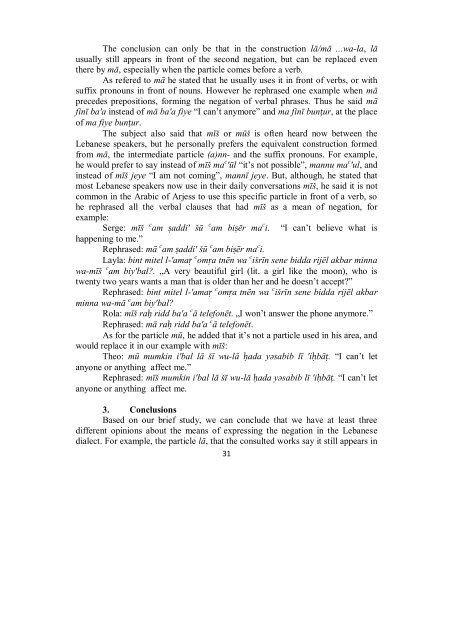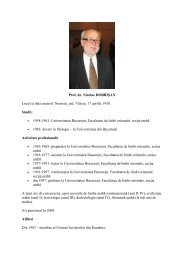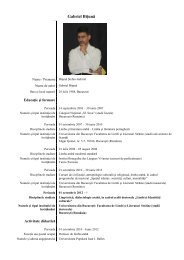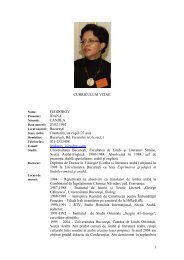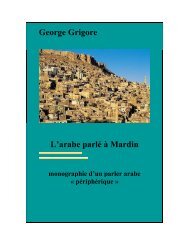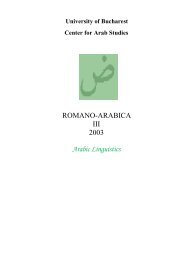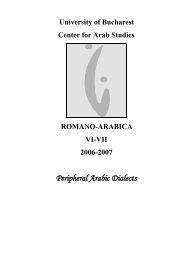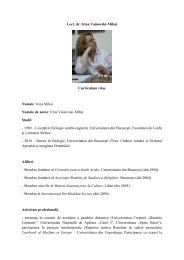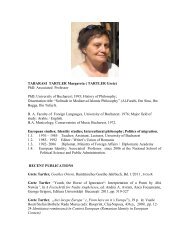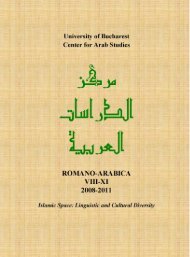12 55 Years of Arab Studies in Romania - Secţia de Arabă
12 55 Years of Arab Studies in Romania - Secţia de Arabă
12 55 Years of Arab Studies in Romania - Secţia de Arabă
You also want an ePaper? Increase the reach of your titles
YUMPU automatically turns print PDFs into web optimized ePapers that Google loves.
The conclusion can only be that <strong>in</strong> the construction lā/mā ...wa-la, lā<br />
usually still appears <strong>in</strong> front <strong>of</strong> the second negation, but can be replaced even<br />
there by mā, especially when the particle comes before a verb.<br />
As refered to mā he stated that he usually uses it <strong>in</strong> front <strong>of</strong> verbs, or with<br />
suffix pronouns <strong>in</strong> front <strong>of</strong> nouns. However he rephrased one example when mā<br />
prece<strong>de</strong>s prepositions, form<strong>in</strong>g the negation <strong>of</strong> verbal phrases. Thus he said mā<br />
f<strong>in</strong>ī ba'a <strong>in</strong>stead <strong>of</strong> mā ba'a fiye “I can’t anymore” and ma f<strong>in</strong>ī bunṭur, at the place<br />
<strong>of</strong> ma fiye bunṭur.<br />
The subject also said that mīš or mūš is <strong>of</strong>ten heard now between the<br />
Lebanese speakers, but he personally prefers the equivalent construction formed<br />
from mā, the <strong>in</strong>termediate particle (a)nn- and the suffix pronouns. For example,<br />
he would prefer to say <strong>in</strong>stead <strong>of</strong> mīš ma c 'ūl “it’s not possible”, mannu ma c 'ul, and<br />
<strong>in</strong>stead <strong>of</strong> mīš jeye “I am not com<strong>in</strong>g”, mannī jeye. But, although, he stated that<br />
most Lebanese speakers now use <strong>in</strong> their daily conversations mīš, he said it is not<br />
common <strong>in</strong> the <strong>Arab</strong>ic <strong>of</strong> Arjess to use this specific particle <strong>in</strong> front <strong>of</strong> a verb, so<br />
he rephrased all the verbal clauses that had mīš as a mean <strong>of</strong> negation, for<br />
example:<br />
Serge: mīš c am ṣaddi' šū c am biṣēr ma c i. “I can’t believe what is<br />
happen<strong>in</strong>g to me.”<br />
Rephrased: mā c am ṣaddi' šū c am biṣēr ma c i.<br />
Layla: b<strong>in</strong>t mitel l-'amaṛ c omṛa tnēn wa c išrīn sene bidda rijēl akbar m<strong>in</strong>na<br />
wa-mīš c am biy'bal?. „A very beautiful girl (lit. a girl like the moon), who is<br />
twenty two years wants a man that is ol<strong>de</strong>r than her and he doesn’t accept?”<br />
Rephrased: b<strong>in</strong>t mitel l-'amaṛ c omṛa tnēn wa c išrīn sene bidda rijēl akbar<br />
m<strong>in</strong>na wa-mā c am biy'bal?<br />
Rola: mīš raḥ ridd ba'a c ā telefonēt. „I won’t answer the phone anymore.”<br />
Rephrased: mā raḥ ridd ba'a c ā telefonēt.<br />
As for the particle mū, he ad<strong>de</strong>d that it’s not a particle used <strong>in</strong> his area, and<br />
would replace it <strong>in</strong> our example with mīš:<br />
Theo: mū mumk<strong>in</strong> i'bal lā šī wu-lā ḥada yəsabib lī 'iḥbāṭ. “I can’t let<br />
anyone or anyth<strong>in</strong>g affect me.”<br />
Rephrased: mīš mumk<strong>in</strong> i'bal lā šī wu-lā ḥada yəsabib lī 'iḥbāṭ. “I can’t let<br />
anyone or anyth<strong>in</strong>g affect me.<br />
3. Conclusions<br />
Based on our brief study, we can conclu<strong>de</strong> that we have at least three<br />
different op<strong>in</strong>ions about the means <strong>of</strong> express<strong>in</strong>g the negation <strong>in</strong> the Lebanese<br />
dialect. For example, the particle lā, that the consulted works say it still appears <strong>in</strong><br />
31


